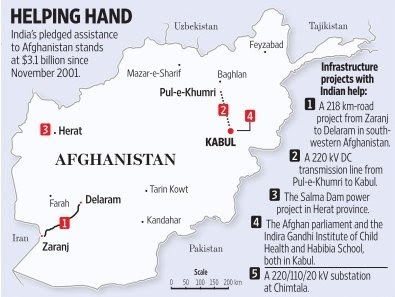International Relations
India in Afghan Peace Process
- 09 Mar 2021
- 6 min read
Why in News
Recently, the USA President has envisaged a New Peace Initiative (Plan) to decide on the roadmap for peace in Afghanistan.
- Under the plan, the USA proposed a regional conference under the United Nations auspices with foreign ministers of the USA, India, Russia, China, Pakistan and Iran to discuss a “unified approach” on Afghanistan.
Key Points
- USA President’s New Peace Initiative:
- Delay in Withdrawal of Troops: This peace plan has kept open the possibility that the USA troops, currently deployed in Afghanistan, might stay on for a longer time.
- Under the earlier USA- Taliban Deal, the USA had promised to withdraw all troops by May, 2021.
- Immediate Action: The USA is pressing the Taliban to accept an immediate agreement to reduce violence for 90 days that will provide the space for the peace initiative.
- Inclusive Process: The USA will not be “dictating terms” to the Afghan parties, but facilitating an inclusive interim government, an agreement on the “foundational principles” for a new political order, and a “permanent and comprehensive ceasefire”.
- Turkey’s Role: The USA is asking Turkey to convene a meeting of the government in Kabul (capital of Afghanistan) and the Taliban to finalise a peace settlement.
- Unified Approach: The USA asked the United Nations to convene a meeting of the foreign ministers from China, Russia, Pakistan, Iran, India and the United States to develop a “unified approach” to peace in Afghanistan.
- Delay in Withdrawal of Troops: This peace plan has kept open the possibility that the USA troops, currently deployed in Afghanistan, might stay on for a longer time.
- India’s Role in Peace Process Through “Unified Approach”:
- India is an important player in the peace process – it has also been acknowledged by the USA.
- India supports all efforts for peace and reconciliation in Afghanistan which are inclusive and Afghan-led, Afghanowned and Afghan-controlled.
- India has invested heavily in infrastructure developments, training security forces and supplying them with necessary equipment.
- India has a major stake in the stability of Afghanistan since it has invested considerable resources in Afghanistan's development.
- India hopes to have a role in setting the terms especially concerning terrorism, violence, women’s rights and democratic values.
- India’s Interest in Afghanistan:
- Economic and Strategic Interest: Afghanistan is a gateway to the oil and mineral-rich Central Asian republics.
- Anyone who is in power in Afghanistan controls the land routes connecting India with Central Asia (via Afghanistan).
- Developmental Projects: The massive reconstruction plans for the country to offer a lot of opportunities for Indian companies.
- Major projects include the Afghan Parliament, the Zaranj-Delaram Highway, and the Afghanistan-India Friendship Dam (Salma Dam).
- Also India’s assistance of more than USD 3 billion in projects, hundreds of small development projects (of schools, hospitals and water projects) have cemented its position in Afghanistan.
- Security Interest: India has been the victim of state-sponsored terrorism emanating from Pakistan supported terrorist group operating in the region (e,g. Haqqani network). Thus, setting up a friendly government in Afghanistan can help tackling Pakistan supported terrorism.
- Economic and Strategic Interest: Afghanistan is a gateway to the oil and mineral-rich Central Asian republics.
- Challenges:
- The Afghan government as well as Taliban are unwilling for any power sharing.
- Taliban is even not willing to give up its sanctuaries in Pakistan. Nor will it accept any dilution of the strict Islamic system that it wants to enforce.
- Also, the Taliban is fragmented or divided internally. It is composed of various regional and tribal groups acting semi-autonomously.
- Therefore, it is possible that some of them may continue to engage in violence impacting the peace process and dialogue.
- The Afghan government as well as Taliban are unwilling for any power sharing.
Way Forward
- An independent, sovereign, democratic, pluralistic and inclusive Afghanistan is crucial for peace and stability in the region.
- In order to ensure the same, the Afghan peace process should be Afghan-led, Afghan-owned and Afghan-controlled.
- Also, there is a need for the global community to fight against the global concern of terrorism. In this context, it high time to adopt the Comprehensive Convention on International Terrorism (proposed by India at UN in 1996).
- Though the new initiative by the USA is a good step, the road ahead would not be easy. Achieving lasting peace in Afghanistan will require patience and compromise among all parties.





